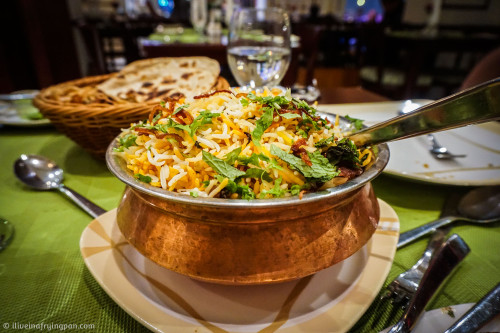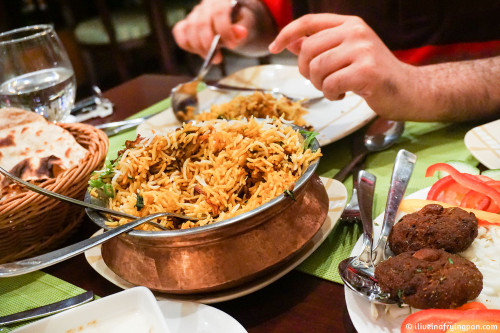 I have finally tasted a biryani that is worth talking about. Not because it’s the best biryani I’ve ever had – that credit unsurprisingly goes to mum and a few other mothers and private chefs in Hyderabad and Dubai – but because the chef perfumed his creation with rosewater.
I have finally tasted a biryani that is worth talking about. Not because it’s the best biryani I’ve ever had – that credit unsurprisingly goes to mum and a few other mothers and private chefs in Hyderabad and Dubai – but because the chef perfumed his creation with rosewater.
This discovery was at Foodlands (also called Cardamom) in Abu Hail, right next to the NMC Hospital. The restaurant has been around since 1999 but has always been sidelined on my eating agenda because if I’m near that building, I’m most likely preoccupied with rushing into the hospital for some sort of medical situation or the other. A month ago, a private dinner party invitation to Foodlands landed me back at the building, hale and hearty. Without the threat of bloodthirsty needles waiting to suck the life out of my arm, I happily unleashed myself on the food and gobbled just short of the quantity needed to land me in a bed next door. During these moments of unfettered feeding, I stumbled upon a chicken biryani spiked – quite generously might I add – with rosewater.
 Now to explain why this is worth spending an entire blog post over, let me put it into context. Biryani is a dish that should stimulate and tease even before it reaches your plate.
Now to explain why this is worth spending an entire blog post over, let me put it into context. Biryani is a dish that should stimulate and tease even before it reaches your plate.
The aromatics should be subtle yet discernible enough to coax your nostrils towards the platter of rice and meat as it walks down the aisle towards your table. Mum’s biryani hits you the second you step through the door, making you weak at the knees with the aroma of cow’s milk ghee and crisp fried onions and toasted nuts and slow-cooked mutton in a secret marinade that morphs into patches of exquisite masala running through the hot, fluffy, saffron-scented grains. As you eat the biryani, your air passage is doubly assaulted with the savoury perfume – the internal one now swirling at the back of your mouth as you taste the meat, and the external one that enticingly wafts up to your nose from the remaining grains on your plate. It makes you king and subject both at once, wholly elevated by the luxurious bouquet of whole spices, wholly enslaved by the arresting bouquet of whole spices.
And this is exactly why most restaurant biryanis fail in Dubai. They have no aroma at all.
The twenty-dirham biryani on the street cannot aspire to use saffron or toasted nuts or ghee or the sort of whole spices (such as black cardamom) and other aromatics that make a simple rice and meat dish transcend into biryani territory. So most of the cheap commercial fare out there is really just pulao, a simple pilaf where they’ve cooked the meat under the rice but scrimped on all the key aromatics.
This is where rosewater seeps in. A bottle of rosewater is far cheaper than a tin of saffron, and a drop goes a long, long way in perfuming a dish.
Now rosewater is a controversial aromatic. At first, I didn’t quite know what to make of its application in a biryani. We don’t use it in our Hyderabadi biryani at home, nor have I ever tasted a biryani in Hyderabad with a discernible drizzle of rosewater. Rosewater usually makes sense in a dessert or drink: sherbet, rice pudding, falooda, even ice cream.
But using rosewater in the biryani distracted my mind from the aromatics that I normally would expect and refocused my senses on the delicate flowery fragrance that now lifted the grains from a provincial pulao to a baronial biryani. While you won’t sense the rosewater before you taste Foodland’s biryani – so it still lacks a memorable external aroma – the fragrance is released at that very instant the biryani meets the back of your mouth. It is a throaty aroma that you internalize, question, debate, ponder over and commit to your gastronomic memory such that you are persuaded to return to the restaurant and taste it again.
I have since tasted another biryani scented with rosewater, this one with mutton and served out of Al Qaiem Public Kitchen in Sharjah. There was no controversy around this version – it was simply spot on. It had those tell-tale patches of masala rubbing shoulders with the grains, tender meat and for twenty dirhams, an astonishing quantity of it. The rosewater had been used far more sparingly, and I would say more successfully than the version at Foodlands. Al Qaiem’s biryani also had dried lime or loomi, an incongruous citric choice given the presence of rosewater. But the result had me reaching back to the tub of biryani multiple times, an honour that I rarely bestow on anything short of a homemade biryani.
Should every restaurant who cannot aspire to the expensive aromatics resort to using a touch of rosewater? Maybe. While rosewater is no saffron, it lets the dish dream of being something more kingly than a pedestrian pulao.
Feel free to hunt down Foodlands and Al Qaiem on my Google map of hideouts: http://bit.ly/1kXvYvs

Now that’s a great idea.. would love to try it at home too..The use of rose water in Biriyani. .☺😊
Love it !
Lovely reading your posts as always for the imagery and drool factor!
On the rosewater subject, I think it’s all a matter of taste. Those who like rosewater (Middle Eastern cuisine uses it quite a lot) and are used to it may enjoy the nuances of rosewater biryani. But those who can’t stand the smell or taste would probably lean towards a more traditional biryani.
I have been drinking rose water for my skin but never thought to put it in my delicious byryanni. However, am up for a new experience lool.
Thanks for the input
Hey Arva, Funnily enough I had a chicken biryani at IKEA, of all places, that was splashed with rosewater. We had a Bangladeshi helper who loved adding rosewater to mutton rezala as well (as a substitute for kewra water). I agree with you, it adds another dimension to the dish. Not everybody likes it though. :-)